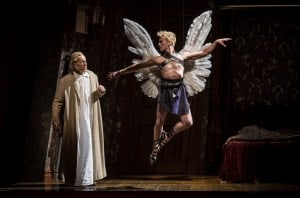
Here are some terms and notions that you may be able to use during this year’s holiday season.
BOŻE NARODZENIE – Christmas (literally: Divine Birth, God’s Birth)
GWIAZDKA – another name for Christmas (literally: Little Star, a reference to the star of Bethlehem)
ŻŁOBEK, SZOPKA, STAJENKA – different names for a Christmas crib, creche or nativity set
CHOINKA, DRZEWKO – Christmas tree (in southern Poland the term 'drzewko’ or little tree is widespread)
BOMBKA – blown-glass-type tree ornament
LAMPKI CHOINKOWE – Christmas-tree lights
WIGILIA-Christmas Eve
OPŁATEK – white, unleavened Christmas wafer shared on Christmas Eve
WIECZERZA WIGILIJNA – Christmas Eve supper
POSTNE POTRAWY – meatless dishes
ŻYCZENIA-wishes
PREZENTY, PODARKI – gifts, presents
KOLĘDA – Christmas carol
PASTERKA – Midnight Mass
PIERWSZY DZIEŃ ŚWIĄT – Christmas Day
WIECZÓR SYLWESTROWY – New Year’s Eve

NOWY ROK – New Year’s Day
Typical (almost stereotypical) Christmas/New Year wishes as seen in stores and greeting cards:
WESOŁYCH ŚWIĄT BOŻEGO NARODZENIA I SZCZĘŚLIWEGO NOWEGO ROKU!
(Merry Christmas and a Happy New Year) If sending a preprinted Christmas card or a letter to Polish friends in Poland or America, you can add something along these lines:
ŻYCZYMY WAM WSZYSTKIM RADOSNYCH I ZDROWYCH ŚWIĄT BOŻEGO NARODZENIA ORAZ WSZELKIEJ POMYŚLNOŚCI W NOWYM 2002 ROKU!
Or, you may also want to add a typically Polish touch:
ŁAMIĄC SIĘ OPŁATKIEM, MYŚLAMI BĘDZIEMY PRZY WAS!
(When we break and share the Christmas wafer, we will be with you in spirit!)
If you want to give the wishes a more religious flavor, the following might be appropriate:
SERDECZNIE ŻYCZYMY, ABY NOWO NARODZONE
BOŻE DZIECIĄTKO POBŁOGOSŁAWIŁO WAM
I OBDARZYŁO WAS OBFITYMI ŁASKAMI!
(We cordially wish the newly born Christ Child to bless you and shower you with His abundant grace!)
Here are some Yule-related sentences that may be helpful. See how many you can understand before going to the translations below.
1. W tym roku jedziemy na Gwiadzkę do mojej rodziny na Florydzie.
2. Na ogół śniegu nie lubię, ale w Boże Narodzenie lubię jak trochę poprószy.
3. W saloniku stoi duża choinka obwieszona lampkami i bombkami, a na telewizorze jest żłóbek.
4. Dla Polaków najważniejsza jest Wigilia, a dla Amerykanów niepolskiego pochodzenia – pierwszy dzień Świąt.
5. Łamiąc się opłatkiem, składamy sobie życzenia.
6. Po wieczerzy wiligijnej, która się składa wyłącznie z postnych potraw, obdarowujemysię prezentami.
7. Potem śpiewamy kolędy, a później wybieramy się na Pasterkę.
8. W Ameryce większość ludzi na obiad świąteczny je pieczonego indyka.
9. Wieczór sylwestrowy zamierzamy spędzić w domu przy telwizorze, a dzieci wybierają się na bal.
10. W Nowy Rok sporo ludzi leczy kaca.
Re-read the above seven sentences out loud and see how much of the meaning you can make out without asking someone or checking the dictionary. Now look through the translations below and see how well you did. If you’re really serious about leaning Polish, write each of the words you didn’t know five times.
1. This year for Christmas we are going to visit my family in Florida.
2. Generally I dislike sn0w, but on Christmas I like when it sprinkles a bit.
3. In the living-room stands a large Christmas tree decorated with lights and ornaments, and on the TV, set is a Christmas crib.
4. For Poles Christmas Eve is the most important, and for non-Polish Americans it is Christmas Day.
5. When he breaks and share the Christmas wafer, we exchange best wishes.
6. After Christmas Eve supper, which is composed exclusively of meatless dishes, we exchange gifts.
7. Then we sing carols and later head for Midnight Mass.
8. In America most people eat roast turkey for their holiday dinner.
9. We plan to spend New Year’s Eve at home in front of the TV set, but the kids are going to a ball.
10. On New Year’s Day many people nurse hangovers.
Wishing you a Merry Christmas and a Happy New Year!








